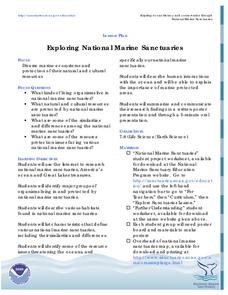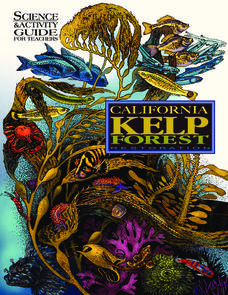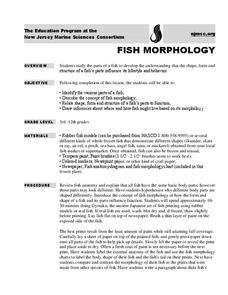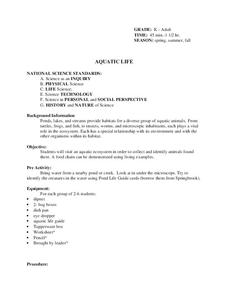University of Waikato
Build a Marine Food Web
Dive into a lesson on marine ecosystem interactions. Individuals learn about and devise a marine food web. The resource provides organism cards and pupils use article resources to discover interactions before modeling them in a food web.
American Museum of Natural History
What is Marine Biology?
A marine environment covers the majority of the earth but is arguably the least understood. Teach young scientists about the characteristics of oceans and ocean species using an interactive online lesson. The in-person or remote learning...
Curated OER
Life in the Crystal Palace
Marine biologists research sea ice communities. Assign some groups to construct paper models of sea ice communities in winter, and some to construct models of them in summer. The lesson is simplistic, but the Internet resources provided...
Curated OER
What's in That Cake?
Cooperative groups research trip logs from deep-sea expeditions and explore characteristics of deepwater habitats. Using a cake as the ocean floor, they work together to decorate it as a model of such habitats. They also prepare a...
Curated OER
Exploring National Marine Sanctuaries
Learners research marine ecosystems by creating class presentations. In this oceanography instructional activity, students research the different locations of marine sanctuaries by identifying them on a transparency map in class....
NOAA
Build Your Own Ocean Ecosystem
Hold the sea in the palm of your hand! Amateur oceanographers work together to create models of an ocean ecosystem in the sixth and final installment in a series. Raise awareness of global ocean health issues through guided research,...
Curated OER
Aquatic Ecosystems
Students study the diversity of marine life and their habitats. In this aquatic ecosystems instructional activity students complete a lab activity and experiment.
Scholastic
Study Jams! Aquatic Ecosystems
Mia's friends are fish-sitting while she is away on vacation. Zoe divulges to Sam that different animals need different habitats, and that there are both freshwater and saltwater ecosystems. Examples of the kinds of organisms found in...
Curated OER
Exploring Marine Ecosystems in the Caribbean and Maine
Students compare the marine habitats of Maine and the Caribbean using temperature, tides, ocean currents, latitude and longitude. In this marine ecosystems activity, students analyze maps to complete graphic organizers that evaluate the...
Curated OER
Marine & Aquatic Habitats Activities - Terrestrial Forests vs. Kelp Forests
Middle schoolers discuss concept and specificity of habitats, both marine and terrestrial, list similarities and differences in the habitats of a kelp forest and a terrestrial forest, compare types of organisms that occupy corresponding...
American Museum of Natural History
Ocean Creature Feature
From coloring to hard protective shells, ocean creatures have adaptation features that help them survive. An eight-question online quiz highlights different ocean animals and their unique characteristics. The resource then offers pop-up...
Curated OER
Exploring the Beach
Students explore the beach. In this marine habitat lesson, students inspect sand grains, design beach profiles, classify marine life, and examine natural beach habitats. Students use spreadsheets to record data from their activities at a...
Curated OER
Sea Connections
Students, after locating different marine habitats on a globe, play a card game about ecosystems, food webs and organisms.
Dawn N . Ericson
California Kelp Forest Restoration
This unit is so cool, you won't be able to "kelp" yourself! Intended for all grades, this science and activity guide for teachers offers a unique opportunity to understand kelp's role as a valuable ecological resource. Teachers and...
Curated OER
environment: Fresh and Saltwater Habitats
Students compare and contrast fresh and salt water coastal environments. After describing how sea animals adapt to their habitats, they design a variety of sea creatures and explain how the adaptations aid in the animals' survival. ...
Curated OER
Fish Fashion 101
Students explore fish anatomy. In this fish anatomy and adaptation lesson, students define and identify the location of fish body parts. Students add these parts of a fish's anatomy to a life-sized fish costume worn by a student. ...
Rainforest Alliance
Protecting the Critical Habitat of the Manatee and Loggerhead Turtle
Explore ocean habitats with a instructional activity that showcases the home of manatees and loggerhead turtles in Belize. Here, pupils compare and contrast the homes of ocean animals to those of humans, listen to an original short story...
Curated OER
Big Fleas Have Little Fleas
A benthic habitat hosts a vast collection of organisms and its structure influences the biodiversity. Middle-school marine biology explorers will discuss how corals impact structure, and therefore diversity, on the ocean floor. They draw...
Consortium for Ocean Science Exploration and Engagement (COSEE)
Fish Morphology
Life comes in all different shapes and sizes, and fish are no exception. Here, young scientists create fish prints as they learn how specific characteristics allow different species to survive in their particular habitats.
Curated OER
Aquatic Life
Students explore aquatic life. In this science lesson, students visit an aquatic ecosystem and collect animals found there. Students create a food chain for the aquatic ecosystem.
Curated OER
Kure Waste Chase Game Lesson
Students work together to identify marine debris. They explain the effect of the debris on various ecosystems. They draw different types of ocean currents as well.
Aquarium of the Pacific
Kelp Forest Conservation
There otter be a better way. As a class, groups work together to create a food web based on the organisms in the kelp forest. Budding scientists watch a video on the kelp forest to see how the organisms create a food web and hear about...
National Geographic
Rescuing, Relocating, and Rehabilitating Wildlife
Bring up the Deepwater Horizon (BP) oil spill that occurred in the Gulf of Mexico in 2010. Display the colorful diagram of the coastal and marine organisms living in the area. Show a video about relocating the eggs of the Gulf's sea...
Curated OER
Design a Reef!
Here is an ambitious, but highly valuable undertaking: set up a miniature coral reef in your classroom. Young marine scientists research coral reef ecosystems and ensure all vital factors are included in their functioning model. The...

























